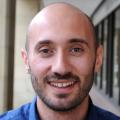
Jewish communities across Greater Manchester will be celebrating the high holidays over the coming weeks, starting with Rosh Hashanah this weekend.
The Jewish new year will begin on the evening of Friday, September 15.
The festival is followed by fast days, including Yom Kippur which starts on Sunday, September 24, and further festivities throughout the Jewish month of Tishrei.
Families and friends come together to celebrate at this time of year, and many congregate in synagogues to hear the blowing of the shofar – a musical horn.
Marc Levy, who is the chief executive of the Jewish Representative Council of Greater Manchester and Region (JRC), said the high holidays are a time of reflection.
He said: “The Jewish community across Greater Manchester will be joining Jews around the world to celebrate Rosh Hashana over the weekend.
“This special festival marks the start of the Jewish New Year.
"As we begin a new year, it is customary to reflect on the previous 12 months.
“What is obvious is that we are fortunate to live in a city who deeply cares for their Jewish community. As the representative body, we would like to place on record our gratitude to all the wonderful charities from our whole diverse community who have undertaken invaluable work.
“We would also like to thank all our friends from wider society.
"Your support is hugely appreciated as it makes Greater Manchester a wonderful place to be Jewish.”
When is Rosh Hashanah and the rest of the high holidays?
Several festivals and fast days are observed throughout the holy month of Tishrei, starting with Rosh Hashanah which literally means "head of the year".
According to the Hebrew calendar, which is based on both the moon and the sun, each new day starts at sundown and this new year will be number 5784.
The Rosh Hashanah celebration, which lasts two days, starts at sundown on Friday, September 15, and ends at nightfall on Sunday, September 17.
Yom Kippur, the day of atonement, involves a 25-hour fast, starting this year at sundown on Sunday, September 24 until nightfall on Monday, September 25.
How do Jewish people celebrate Rosh Hashanah and the high holidays?
Families and friends typically come together to celebrate with a meal on both nights which is preceded by a ceremony involving prayers and special foods.
Apples are dipped in honey to mark a sweet and fruitful new year and pomegranates, honey cake and round challah bread are also consumed.
The first day of Rosh Hashanah is the beginning of ten holy days known as the high holidays – or the high holy days – which is a time of repentance for Jews.
Throughout this time of year, many congregate in synagogues to worship, particularly on Rosh Hashanah and on the tenth day – the fast of Yom Kippur.
In synagogue, the blowing of the shofar – a ram’s horn – must be heard by congregants at the new year service as well as at the end of Yom Kippur.
How do you wish someone Happy New Year?
At Rosh Hashanah, Jewish people say "shanah tova", which means "good year", or "shanah tovah u’metukah", which is Hebrew for "a good and sweet new year".
Prestwich Cllr Richard Gold, who is the council’s cabinet member for finance and communities said: “Shanah Tovah to everyone celebrating.
“Wishing all our Jewish residents a happy, peaceful, prosperous New Year and wish them well over the fast.”



Comments: Our rules
We want our comments to be a lively and valuable part of our community - a place where readers can debate and engage with the most important local issues. The ability to comment on our stories is a privilege, not a right, however, and that privilege may be withdrawn if it is abused or misused.
Please report any comments that break our rules.
Read the rules here